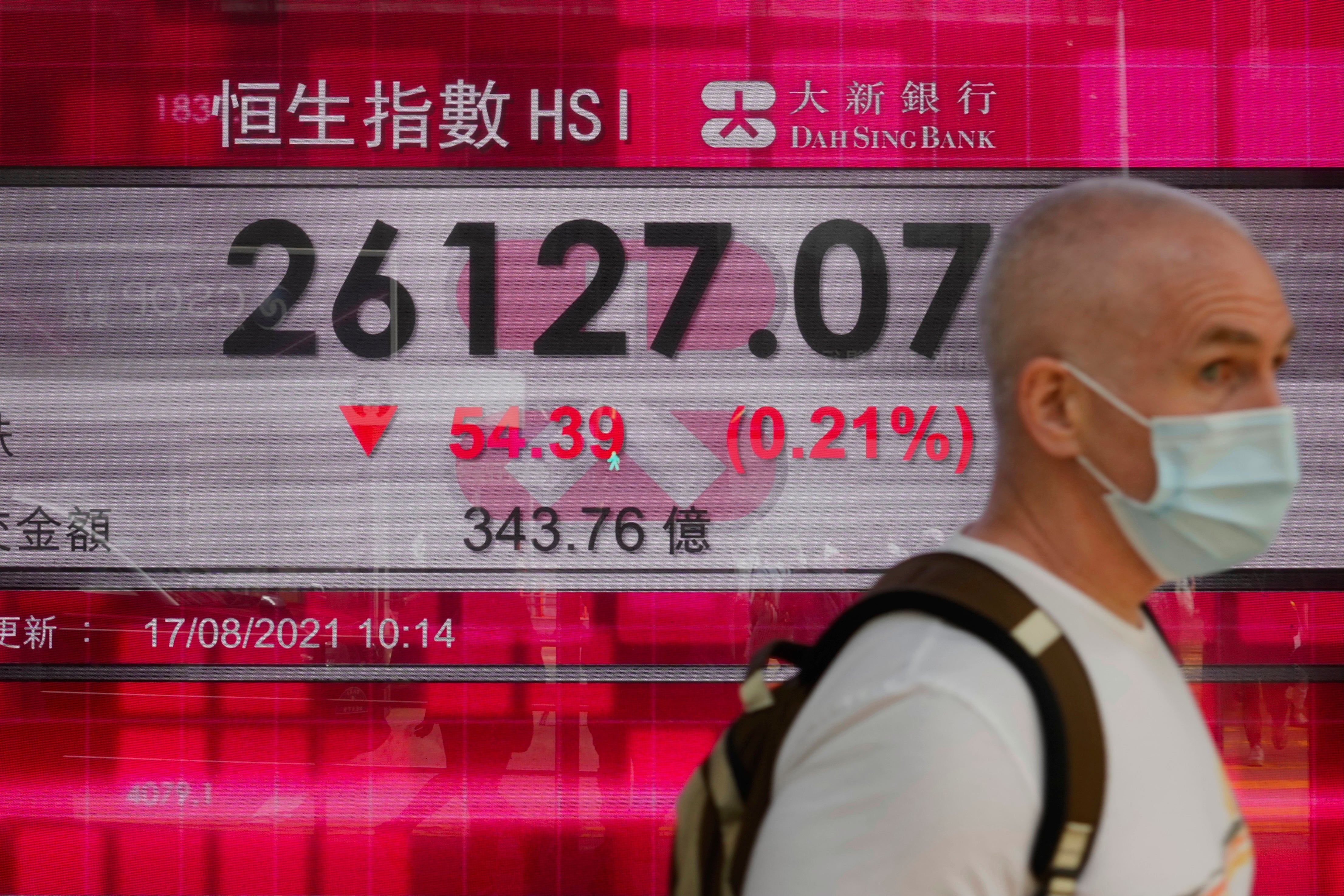Asian markets lower amid China, Afghanistan unease
Asian stock markets have declined amid turmoil in Afghanistan and unease about China's economic outlook after July activity was weaker than expected

Your support helps us to tell the story
From reproductive rights to climate change to Big Tech, The Independent is on the ground when the story is developing. Whether it's investigating the financials of Elon Musk's pro-Trump PAC or producing our latest documentary, 'The A Word', which shines a light on the American women fighting for reproductive rights, we know how important it is to parse out the facts from the messaging.
At such a critical moment in US history, we need reporters on the ground. Your donation allows us to keep sending journalists to speak to both sides of the story.
The Independent is trusted by Americans across the entire political spectrum. And unlike many other quality news outlets, we choose not to lock Americans out of our reporting and analysis with paywalls. We believe quality journalism should be available to everyone, paid for by those who can afford it.
Your support makes all the difference.Asian stock markets declined Tuesday amid turmoil in Afghanistan and unease about China s economic outlook after weak July activity.
Investors looked ahead to a speech by Federal Reserve chairman Jerome Powell for an update on the health of the biggest global economy. Traders also were waiting for U.S. sales and factory data.
Shanghai, Hong Kong and South Korea declined while Tokyo gained.
Wall Street's benchmark S&P 500 hit a new high despite rising U.S. coronavirus infections.
Traders got “some positive sentiment” from Wall Street but were “paying close attention to the situation in Afghanistan,” said Anderson Alves of ActivTrades in a report.
Landlocked Afghanistan's economy is tiny, but other governments were caught off guard by the speed of the collapse of its U.S.-allied leadership. Thousands of people tried to flee the country after the Taliban seized the capital, Kabul.
Markets also were digesting news that Chinese factory output, consumer spending and investment grew slower in July than expected. The government blamed flooding in central China and controls on travel and business to fight outbreaks of the coronavirus's delta variant.
That led to a drop in oil prices Monday as traders adjusted forecasts of Chinese demand.
Beijing s policy of pursuing zero virus cases “points towards the risk of aggressive measures” that “may continue to put a cap on growth,” said Yeap Jun Rong of IG in a report.
The Shanghai Composite Index lost 0.5% to 3,500.43 while the Nikkei 225 in Tokyo gained 0.7% to 27,545.46. The Hang Seng in Hong Kong shed 0.7% to 26,002.66.
The Kospi in Seoul sank 0.8% to 3,145.14 while Sydney’s S&P-ASX 200 declined 1.1% to 7,469.90.
India's Sensex opened up less than 0.1% at 55,597.78. New Zealand, Singapore and Indonesia declined while Bangkok gained.
On Wall Street, the S&P 500 rose 0.3% to 4,479.71. The Dow Jones Industrial Average added 0.3% to 35,625.40. The Nasdaq fell 29.14 points to 14,793.76.
Technology and health care stocks accounted for much of the gain in the S&P 500.
Sectors traditionally considered lower risk, including utilities and companies that make food and personal goods also helped lift the market. Those gains outweighed a pullback in banks, energy stocks and a swath of retailers and travel sector companies.
Analysts had expected U.S. economic growth to slow from its breakneck pace earlier this year, but the highly contagious delta variant has prompted even more caution from investors.
In energy markets, benchmark U.S. crude rose 5 cents to $67.34 per barrel in electronic trading on the New York Mercantile Exchange. On Monday, the contract dropped $1.15 to $67.29. Brent crude, used to price international oils, gained 4 cents to $69.55 per barrel in London. It lost $1.08 to $69.51.
The dollar gained to 109.32 yen from Monday's 109.24. The euro declined to $1.1769 from $1.1776.